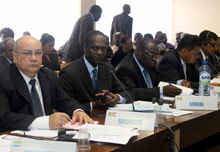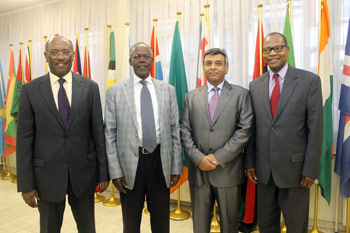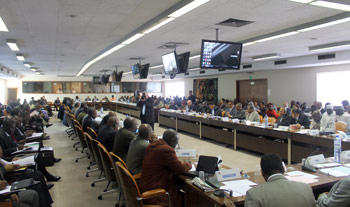ACP politicians talk trade, EU aid agenda in Brussels
 Brussels, 22 September 2012/ ACP: Members of Parliament from Africa, the Caribbean and the Pacific met in Brussels this week to discuss issues pertinent to their countries and prepare for the upcoming Joint ACP-EU Parliamentary Assembly to be held in Paramaribo, Suriname in November.
Brussels, 22 September 2012/ ACP: Members of Parliament from Africa, the Caribbean and the Pacific met in Brussels this week to discuss issues pertinent to their countries and prepare for the upcoming Joint ACP-EU Parliamentary Assembly to be held in Paramaribo, Suriname in November.
The meeting heard reports from the Assembly’s Standing Committees as well as special presentations by the Ambassadorial Working Group for Future Perspectives of the ACP and the Working Group on the 7th ACP Summit for Heads of States and Governments, planned for December.
ACP Secretary General Dr Mohamed Ibn Chambas took the occasion to commend parliamentarians in pressing EU counterparts for a compromise on a bid by the European Commission to bar some ACP countries from privileged access to EU markets if they fail to conclude trade talks by the end of 2013. The European Parliament voted to extend the deadline for negotiations by two years.
“Thanks goes to your colleagues at the EU Parliament, who have heard your voices not to withdraw Market Access Regulation 1528 [which would amend the list of countries with privileged access] at such short notice…I believe that provides a more conducive atmosphere for the negotiations to continue,” said the Secretary General.
Negotiations have been ongoing since the early 2000’s, but various concerns from ACP states are still unresolved.
Dr Chambas added that ACP countries “were not entirely out of the woods yet” on the matter: “By the EU procedures, when the Commission’s position differs as it does now from the Parliament position, there will be a reconciliation meeting at the level of the EU Council.”
He urged MPs to work with their governments in lobbying the Council of the EU to back the Parliament’s compromise.
Differentiation concerns
ACP parliamentarians also discussed the issue of differentiation, which is included in the EU Commission’s policy proposal on development cooperation known as Agenda for Change. This proviso linking aid delivery to national economic levels would mean a sharp reduction or complete removal of grant aid to High Income and Upper Middle Income ACP countries, while focussing resources to the least developed.
Some members raised concerns that this would undermine the progress such countries worked so far to achieve, and may even encourage others to “stay poor”.
One MP summarised for his country: “Yes, Seychelles has a comparatively high GDP per capita… but like many other Small Island Developing States (SIDS), [it] also has a high cost per capita and in need of development infrastructure for the country.”
He called for active dialogue with the Commission and for both the EU Commission and ACP Secretariat to undertake careful analysis of the consequences of such a policy.
Another representative from the Caribbean pointed out that 70% of people struggling below the poverty threshold live in Middle Income Countries, and many – especially SIDS – remain fragile and vulnerable, despite high GDP figures at first glance.
The ACP Secretary General assured Members that the European Commission was engaged in discussions, and that any application of differentiation is unlikely during the 2014-2020 financial framework.
(Pictured: [from top] MPs from Seychelles, Senegal, haiti and Samoa in session; President of the ACP Parliamentary Assembly Hon. Musikari Kombo of Kenya [second from left] pictured with the Ambassador Eltigani Salih Fidail of Sudan, Ambassador Ajay K Bramdeo, Permanent Representative of the African Union and ACP Secretary General Dr Mohamed Ibn Chambas at a reception hosted by the African Union for African MPs; ACP Parliamentary Assembly in session in Brussels)
– ACP Press
